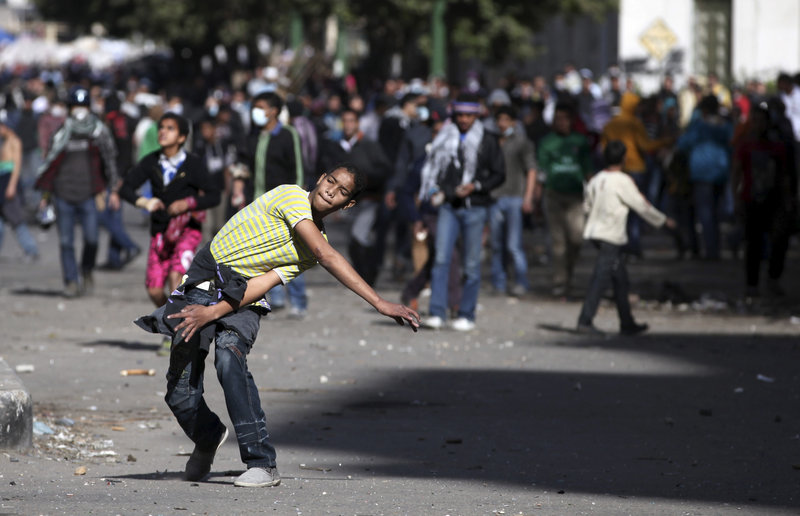CAIRO – A key Egyptian opposition leader Wednesday called for talks with President Mohammed Morsi, ultraconservative Islamists and military officials to quell days of rioting that have killed more than 50 people and left the country edging toward anarchy.
The proposal by Nobel Peace Prize laureate Mohamed ElBaradei, a leader in the National Salvation Front, came as two men were killed near Tahrir Square and nationwide protests echoed for a sixth day. The sense of urgency is high, but disparate political factions have rarely succeeded in putting aside differences.
“We need an immediate meeting between the president, defense and interior ministers, the ruling party, the Salafis and the National Salvation Front to take urgent steps to halt the violence and start serious dialogue,” ElBaradei, who this week had rejected talks with Morsi, wrote on his Twitter account.
The move comes a day after Egypt’s military commander warned Morsi and his political enemies to reach a compromise before the economy collapses. The nation is in danger of unraveling in a rebellion that has made clear the police have lost control and the Islamist-led government lacks the respect to even enforce a curfew in restive cities along the Suez Canal.
It is uncertain if the opposition can play a major role in stemming the chaos.
The National Salvation Front is divided, scattered and lacks credibility among poorer and working-class protesters.
But ElBaradei’s call for talks would gather key players to resolve unrest that has damaged Egypt’s international standing at a time it needs billions of dollars in foreign investment.
The opposition earlier had balked at Morsi’s offer for national dialogue, blaming him for the bloodshed. But pressure has grown to find a solution. The ordeal has so altered the political landscape that the mainly secular opposition is siding with the ultraconservative Islamist Salafis to force Morsi and his more moderate Muslim Brotherhood into a unity government.
That unlikely alliance highlights the widening fissures among Islamist parties and further indicates that Morsi and the Brotherhood have badly miscalculated the nation’s political dynamics since the movement’s rise to power following the overthrow two years ago of Hosni Mubarak.
Copy the Story Link
Send questions/comments to the editors.



Success. Please wait for the page to reload. If the page does not reload within 5 seconds, please refresh the page.
Enter your email and password to access comments.
Hi, to comment on stories you must . This profile is in addition to your subscription and website login.
Already have a commenting profile? .
Invalid username/password.
Please check your email to confirm and complete your registration.
Only subscribers are eligible to post comments. Please subscribe or login first for digital access. Here’s why.
Use the form below to reset your password. When you've submitted your account email, we will send an email with a reset code.